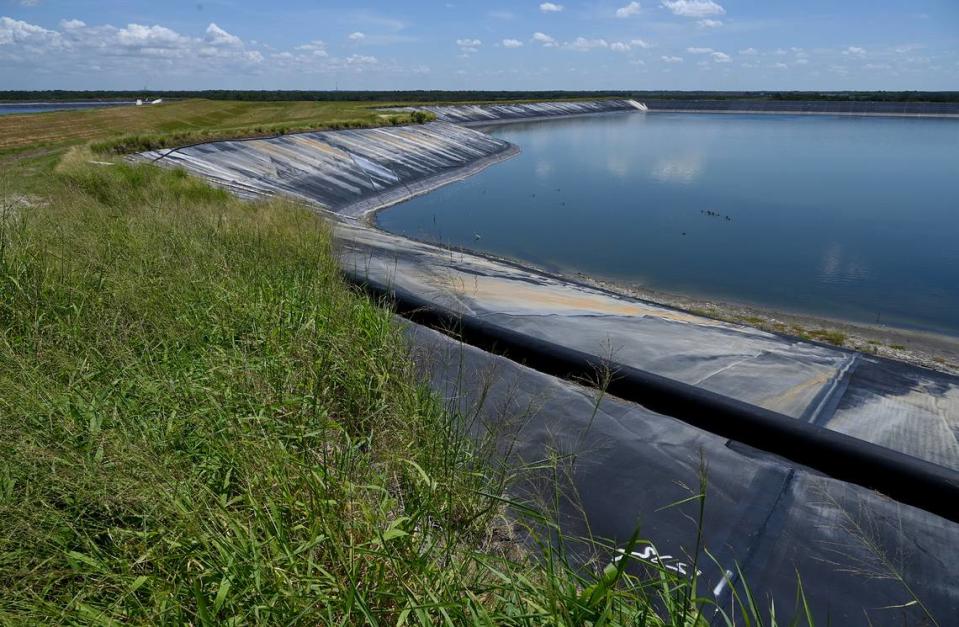Florida regulators have agreed to a settlement in a federal lawsuit over pollution from Piney Point that will create tougher pollution standards and federally enforceable oversight for the industrial site in Manatee County.
Several Florida-based environmental groups filed the lawsuit against the Florida Department of Environmental Protection (FDEP) in June 2021. It was two months after state regulators approved an emergency discharge of 215 million gallons of contaminated water from the troubled site into Tampa Bay.
Researchers found the release likely contributed to severe harmful algal blooms that year, including a major red tide that killed hundreds of tons of wildlife. The lawsuit accused the state of violating the Clean Water Act and the Resource Conservation and Recovery Act.
Terms of a proposed settlement agreement between the FDEP and the environmental groups were filed in the U.S. District Court’s Tampa-based Middle District of Florida on Monday.
In the filing, FDEP agreed to stricter pollution oversight and water quality testing until Piney Point’s ongoing closure is complete. The state also agreed to fund $75,000 in independent water quality testing near Piney Point to be overseen by the Tampa Bay Estuary Program.
In return, the environmental groups agreed to dismiss all of their lawsuit’s claims against FDEP. A federal judge acknowledged the settlement and dismissed the claims against the state on Monday.
“A strong, enforceable Clean Water Act permit for Tampa Bay’s most problematic polluter is long overdue,” said Ragan Whitlock, attorney for the Center for Biological Diversity.
The Center filed the suit against the state along with Tampa Bay Waterkeeper, Suncoast Waterkeeper, Manasota-88 and Our Children’s Earth Foundation.

Florida agrees to stricter pollution oversight
In the settlement, FDEP agreed to draft language for a Clean Water Act permit that will require the agency to monitor and publicly report on potential sources of pollution at Piney Point. The permit establishes criteria for the amount of pollutants allowed in water that leaves the site.
“Now there are actual enforceable limits in place for how much nutrient can come out the Piney Point facility — nitrogen, phosphorous and a host of others,” Whitlock told the Herald. “If they are exceeded, then the permit holder would be in violation and there can be enforcement action.”
Enforcement could include fines or citizen lawsuits that target permit violations.
The agreement also requires FDEP to report “any noncompliance which may endanger health or the environment.”
The former phosphate processing plant holds toxic byproducts from the mining industry stored in large mounds called gypsum stacks. The stacks have historically been topped with ponds containing millions of gallons of contaminated rainwater and process water — a byproduct of industrial processes and manufacturing that contains nutrients that can harm water quality. Material from the dredging of Port Manatee is also stored there.
One of the four ponds was closed in late 2023, and the remaining ponds are now in the middle of being drained and closed.
To dispose of the process water, Manatee County commissioners opted for an underground injection well. Despite assurances that the water would be treated before being sent deep underground, some residents and environment advocates were concerned it could lead to contamination of the aquifer.
The terms of the Clean Water Act permit in the settlement require the state to monitor and report on the quality of water transferred to the underground injection well.
The settlement also requires monitoring and reporting of stormwater discharges from the site, groundwater quality and testing for toxins that are harmful to humans and wildlife.
“The settlement establishes a new standard of transparency for the water quality exiting the plant, a crucial step in safeguarding the well-being of our community,” Suncoast Waterkeeper Executive Director Abbey Tyrna said in a news release. “Additionally, it imposes critical restrictions on key pollutants, ensuring a more sustainable and healthier future for our bay.”

How far along is Piney Point closure?
Herb Donica, the independent, court-appointed receiver who oversees daily closure operations at Piney Point, described the settlement as “incredibly positive.”
“It’s recognition by the environmental groups and the state that this needs to happen,” Donica said of Piney Point’s closure.
Donica said the lawsuit settlement won’t significantly change operations at Piney Point. He said the site is staffed 24/7 and constant water quality monitoring and testing are already taking place.
“Nothing there changes,” Donica said. “We will continue to do that.”
But he said the Clean Water Act permit will make the monitoring requirements legally binding and provide assurance to the public.
“It will be enforceable going forward,” Donica said. “We’ll have a federal court order that this is happening.”
Donica estimates the site is roughly halfway to full closure.
As of July 5, over 209 million gallons of water have been removed, according to FDEP.
Site operators are currently working to dredge the largest reservoir on the site, the New Gypsyum Stack South pond, so it can be closed. The closure of all four ponds is expected to be complete by 2025, Donica previously told the Herald.
EMEA Tribune is not involved in this news article, it is taken from our partners and or from the News Agencies. Copyright and Credit go to the News Agencies, email news@emeatribune.com Follow our WhatsApp verified Channel





